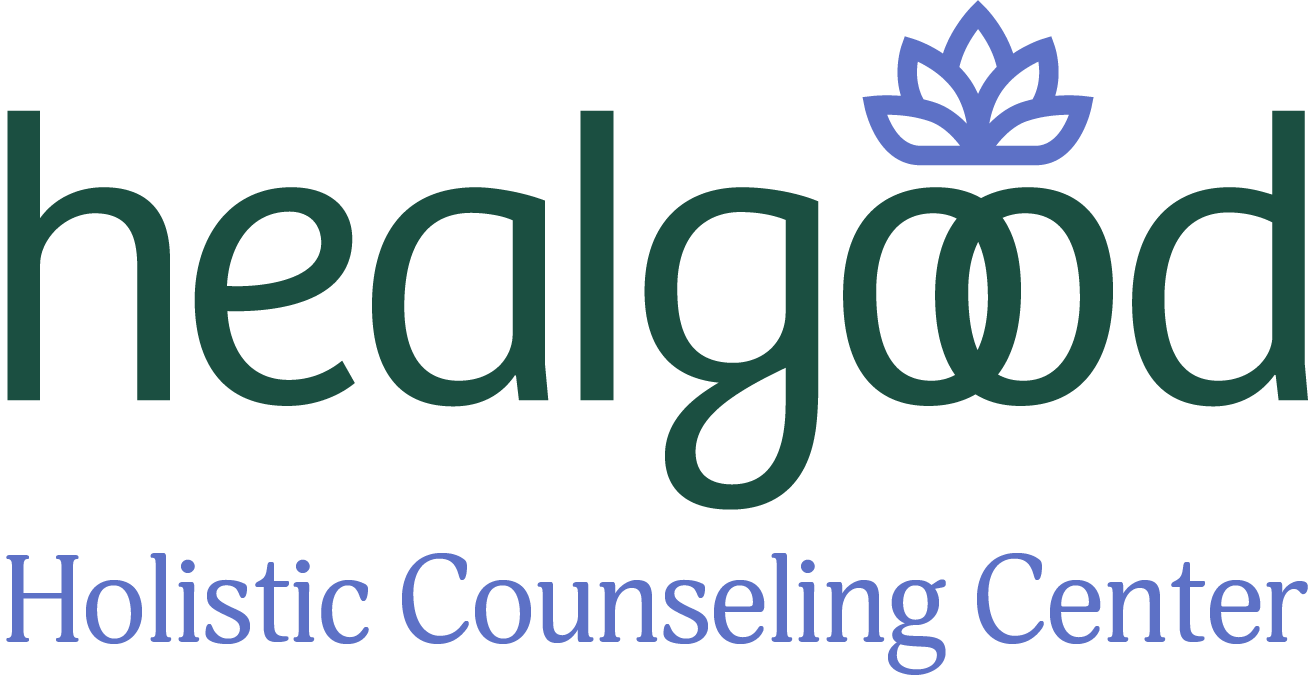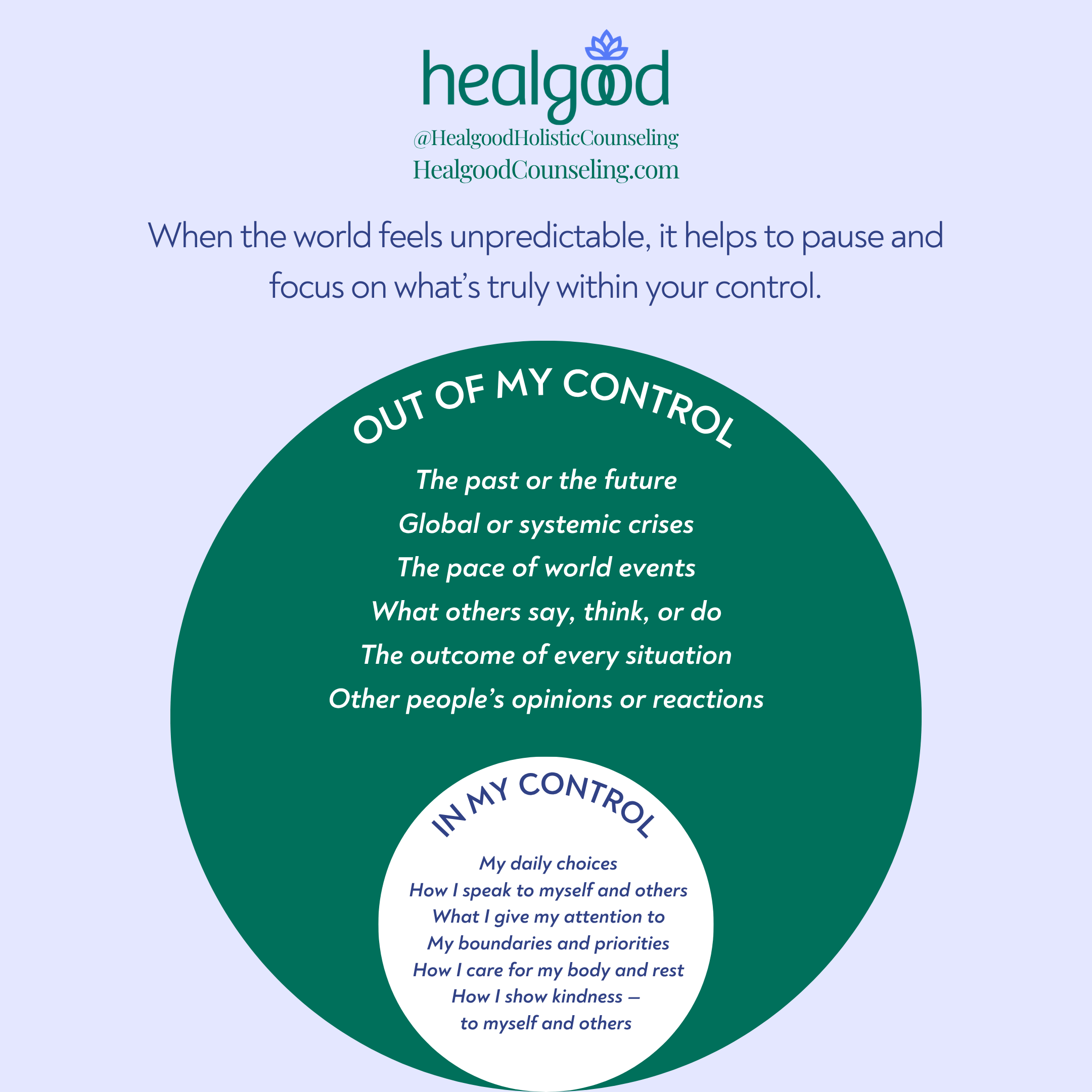World Mental Health Day 2025: Finding Steadiness in Unsteady Times
Maybe you've noticed it — the tightness in your chest when you open a news app. The exhaustion that settles in after scrolling. The sense that the world is spinning faster than you can keep up with.
Natural disasters, humanitarian crises, and constant collective uncertainty can make the ground beneath us feel unstable. World Mental Health Day (October 10th) reminds us that mental health is not a luxury. It's a human need — especially in moments of instability, fear, and loss.
At Healgood, we believe that even when the world feels out of control, there are still meaningful ways to care for our minds, our hearts, and one another.
As the Mental Health Foundation highlights, our 24/7 news cycle feeds us a steady stream of distressing headlines that can quietly wear on our well-being. Even small, daily doses of bad news can take a toll. With so much information online, it may feel impossible to manage — but we can take intentional steps to reduce how much these worries impact our mental health.
The Impact of Overwhelm
Feeling overwhelmed isn't just an emotional response — it's a full-body experience. When our nervous system senses danger, it activates the fight, flight, or freeze response to keep us safe. This is helpful in a crisis but harmful when it never turns off.
After prolonged exposure to distressing news or chronic uncertainty, you might notice changes like:
Physical impacts
Muscle tension or aches
Fatigue or sleep issues
Digestive changes
Nail biting or restlessness
Mental impacts
Trouble focusing or making decisions
Low motivation
Memory difficulties
Constant worry
Emotional impacts
Irritability or anger
Sadness
Apathy or numbness
Despair
Feeling "stuck"
Chronic stress builds gradually. You may not notice it at first, or you may try to "push through." But these are human reactions to an increasingly unstable world — not personal failures. Recognizing them is the first step toward reclaiming your balance.
If any of this resonates, you're not alone — and there are ways to find your footing again.
Radical Acceptance: A Skill for Difficult Times
So what do we do when the overwhelm feels endless?
Radical acceptance, a cornerstone of Dialectical Behavior Therapy (DBT), is not about approval or resignation. It's about acknowledging reality as it is — recognizing both what's within your control and what's beyond it.
When we stop fighting against what is, we release the energy trapped in resistance. That energy becomes available for effective action — or sometimes, simply for breathing.
Here's what this looks like in practice: You can't control a hurricane's path, but you can accept that it's happening and then decide — based on that reality — whether to evacuate, prepare your home, or help a neighbor. Acceptance doesn't mean giving up; it means seeing clearly so you can act effectively.
Focus on What You Can Control
When so much feels uncertain, start small. Focus on what's within reach:
Within Your Control:
Your daily choices — how you care for yourself and rest.
Try this: Set a daily self-care routine - small, realistic acts that support steadiness - such as regular meals, sleep hygiene routine, or a joyful activity.Your boundaries — protecting your nervous system from constant input.
Try this: Set a specific "news window" (15 minutes, twice daily) instead of constant checking.Your compassion — toward yourself and others.
Try this: When you notice self-criticism, pause and ask: "What would I say to a friend right now?" Learn more about self-compassion.Your connections — the people, routines, and spaces that help you feel safe.
Try this: Text one person today. Not to fix anything — just to connect.
Beyond Your Control:
The pace of world events
Other people's choices or reactions
The unknowns that haven't yet unfolded
Letting go of what we cannot control isn't giving up — it's choosing where to place our limited energy.
Signaling Safety with Paced Breathing
Why it works: When we're overwhelmed, our sympathetic nervous system (responsible for the “fight-or-flight” response) stays activated, keeping us in a state of high alert. Controlled, deep breathing — especially with a longer exhale — activates the parasympathetic nervous system (the "rest-and-digest" response) by stimulating the vagus nerve. This signals to your body that it's safe to calm down.
How to practice:
Breathe in slowly through your nose for 4 counts
Hold gently for 4 counts
Exhale slowly through your mouth for 8 counts
Repeat 4 times or until you notice a shift
You can do this anywhere — at your desk, in your car, before bed, or right here while reading this post.
Access to Care: Community as Lifeline
In times of global instability, access to mental health care matters more than ever. At Healgood, we're committed to expanding that access through sliding scale therapy and supportive groups that bring healing into community.
Because care should be reachable, not rare.
When to Seek Support
If you're experiencing persistent symptoms of overwhelm, or if distress is interfering with daily life, reaching out for professional support is an act of strength, not weakness. At Healgood, we offer accessible care options designed to meet you where you are.
A Shared Responsibility



For clients, radical acceptance can serve as an anchor in uncertainty. For clinicians, it's an act of self-compassion — acknowledging what we can hold, and what we cannot.
This World Mental Health Day, we invite you to pause, breathe, and ask yourself:
"What's one thing I can accept today, so I can move forward with more peace?"
And then ask: "What's one small action I can take from that place of acceptance?"
Whether that's reaching out for support, setting a boundary with the news, or simply giving yourself permission to rest — that action matters.
With compassion and care,
References:
Linehan, M. M. (2015). DBT skills training manual (2nd ed.). Guilford Press.
Mental Health Foundation. "Overwhelm: When Global Events and Relentless Bad News Become Too Much." Retrieved October 9, 2025, from https://www.mentalhealth.org.uk/explore-mental-health/articles/overwhelm-when-global-events-and-relentless-bad-news-become-too-much
Najavits, L. M. (2002). Seeking safety: A treatment manual for PTSD and substance abuse. Guilford Press.
We don't have to navigate overwhelm alone. The Mental Health Foundation provides these free, accessible resources to help all of us set boundaries with distressing news, manage global anxiety, and find moments of steadiness.





